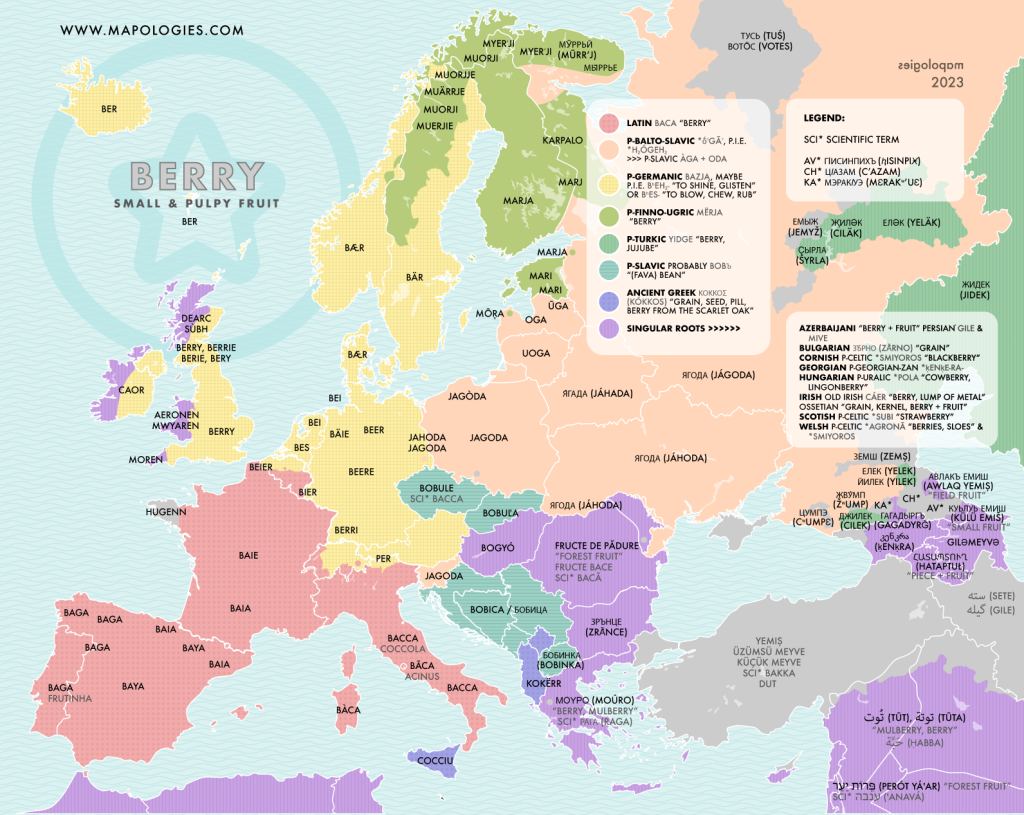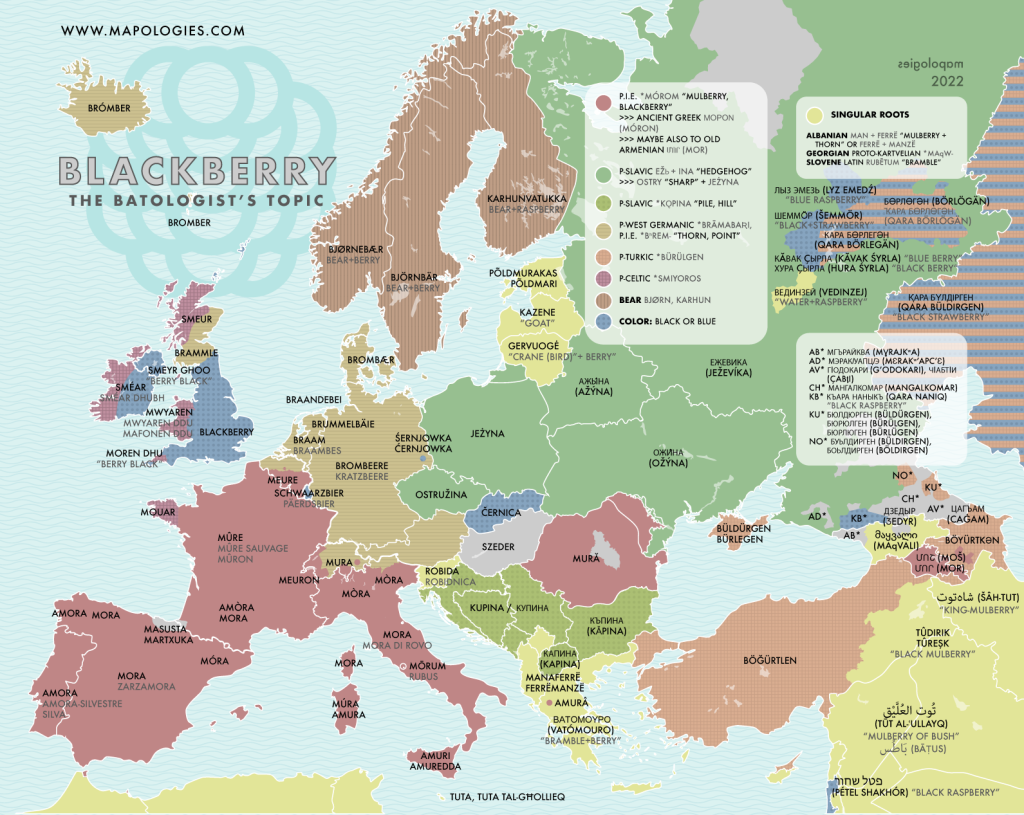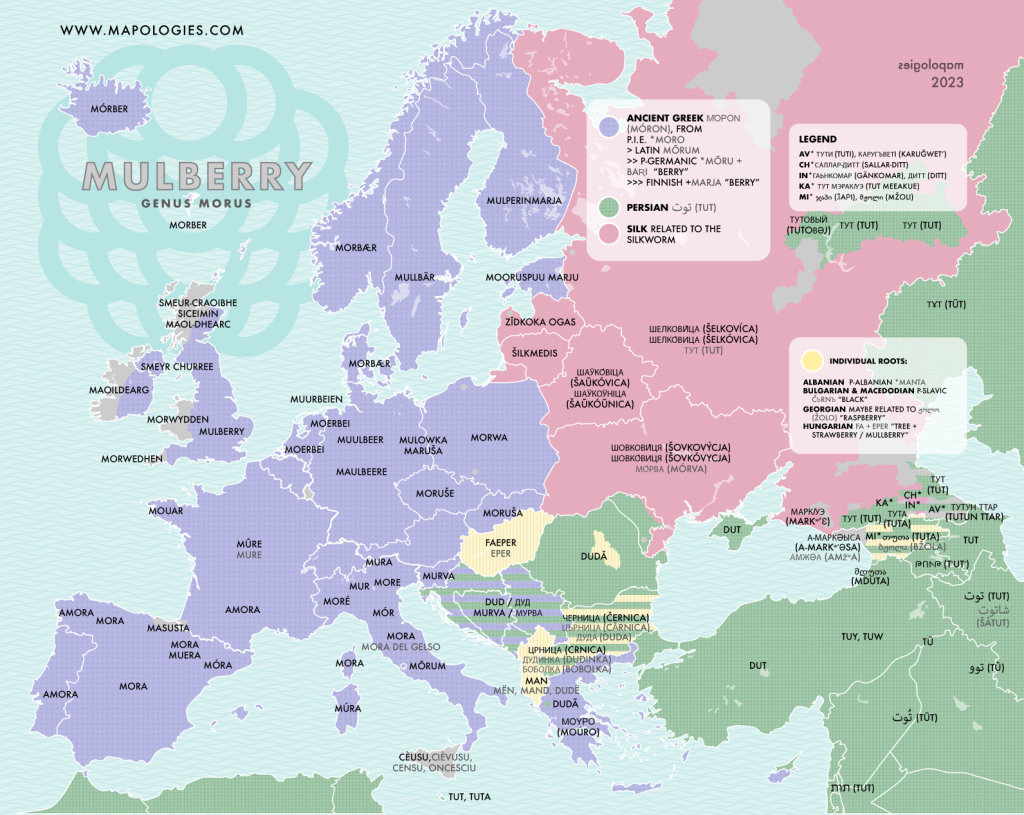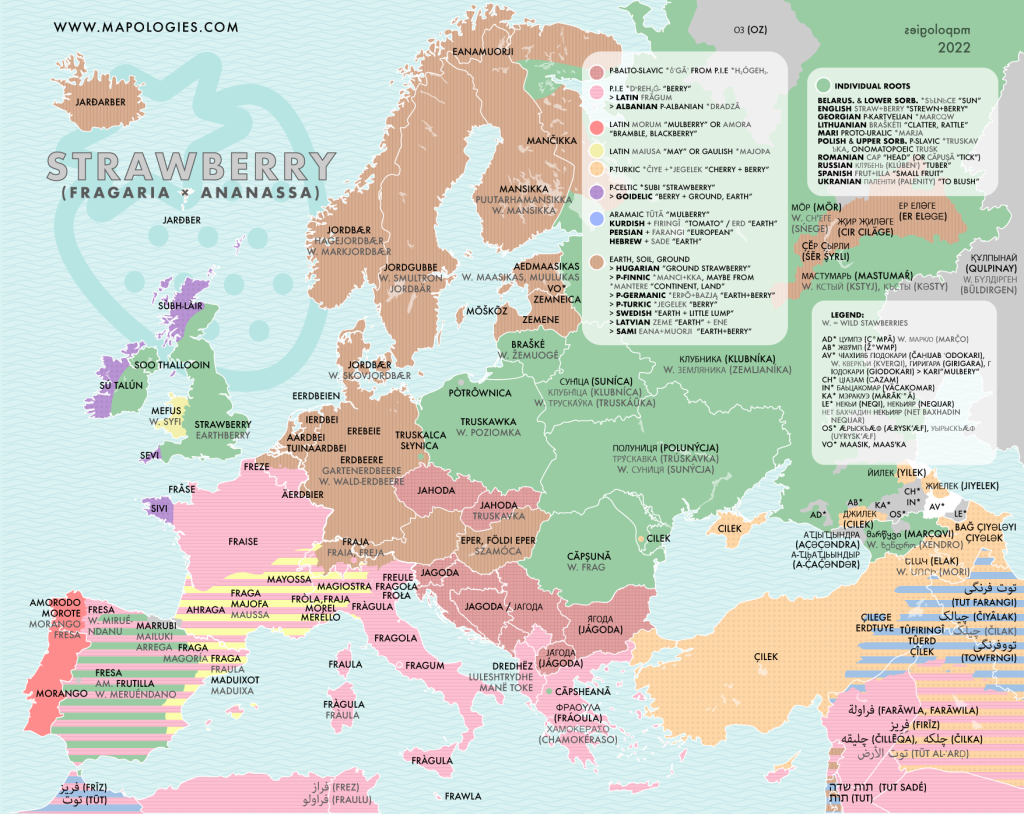In this post, we will compare the English names, that include “-berry”, with the names in other languages. Surely, it will be berry interesting!
Berry

Berries are small, juicy, and colorful fruits that grow on various plants. The word comes from Proto-Germanic bazją. It is a problematic term to translate for several reasons: First, berry is just not an easily translatable term; currants, despite not having the ending -berry, are berries. Second, commonly, berries refer to a specific type of fruit like blueberries and cranberries. However, scientifically, a berry is a fleshy fruit produced from a single ovary. It does not include blackberries, raspberries, or strawberries but may include fruits, like grapes, bananas, or tomatoes, which people do not consider berries.
Blackberry

Blackberries are the fruits of various species within the Rubus genus. They hold intriguing associations with animals in some cultures. In English combines the words black and berry, because of its dark-colored drupelets. Similarly, in Slovak, they say černica, stemming from čierny, meaning “black.” In Kazakh, people know them as Қара бүлдірген, which translates to “black strawberry.”
Across various languages, blackberries are linked to animals. In the northern regions, they are commonly known as “Bearberries” (in English this name describes something different). Latvians associate them with goats, and Lithuanians connect them to cranes. Among Slavic people, there are two distinct perspectives: on the northern side the name derives from the word “hedgehog”, while the southern side comes, not from any animal, but from “hill”.
In the regions spanning the Balkans, Asia, and Africa, a striking linguistic trend emerged as the word “tut” gained widespread acceptance. Originating from Persian, specifically denotes the mulberry tree and its fruit. This phenomenon highlights the remarkable ability of words to transcend geographical confines and seamlessly integrate into the everyday lexicon of diverse communities.
Let’s now explore the genuine dark aspects of this map. Romance languages have borrowed the term “morum” from Latin, signifying both “blackberry” and “mulberry” (as evident in the section below). Within this language group, there will arise instances where distinguishing between the two will be essential.
Blueberry

In Germanic languages like English, the berry derives its name from its vivid blue hue. Conversely, in certain Slavic languages such as Russian, it is referred to as “черника” (chernika), which translates to “blackberry.” This association with the term “blackberry” extends to other Eastern languages like Finnish, Crimean, and Azerbaijani. Notably, many Slavic languages trace their term back to the Proto-Slavic root “borb,” originally meaning “pine tree.”
Furthermore, some special linguistic roots have enjoyed widespread adoption. For instance, the Basque term “anabi” has been embraced by speakers of Catalan and Occitan. Similarly, the Greek word “murtos,” which signifies myrtle, may have influenced the naming of blueberries in certain Western languages. Additionally, the Greek term “dphane,” meaning laurel, spread among Hungarians and Romanians. This diversity in linguistic influences reflects the complex interplay of cultures and languages throughout history.
Cranberry

If you’re curious why so many languages link cranberries with cranes, take a look at the flowers; they resemble the neck, head, and bill of a crane. In Old English, they were also called “fenberries” because they grow in areas with moss, fen, or peat, similar to the German “Moosbeere” or even the Tatar “muk cilage.”
In some Southern languages, cranberries are seen as red-tinted blueberries: Italians say “mirtillo rosso,” and Portuguese say “arando-vermelho.”
There are only two main roots shared among languages. Some Slavic languages inherited the word from Proto-Slavic *brusьnica, which in some cases now means lingonberry. It likely came from the Proto-Indo-European root *bʰrowḱ-. The second root is not Proto-Indo-European but Finnic: “Karpa.” However, this root likely originated from a Baltic language, possibly from “skarbala,” in reference to its sourness.
Gooseberry

Folk etymology refers to a process of alteration of the spelling, pronunciation, or interpretation by which the form of a word is changed by speakers in such a way that it aligns with more familiar words or expressions. This often happens when people are unfamiliar with the true origin or meaning of a word and attempt to make sense of it based on existing words in their language.
A notable example is “goose berry.” The question arises: the berry of what? While “goose” may initially seem to refer to the bird, certain theories suggest an alternative origin. Some propose that it could be derived from the French word “groseille,” meaning “redcurrant,” or from the Dutch term “kruisbes,” signifying “gooseberry.” This Dutch borrowing is believed to have disseminated throughout Western Europe.
On the other side, in the East, the languages adopted the Italian term “agresto,” which refers to verjuice, an acidic juice produced by pressing unripe grapes. Interestingly, Italian itself does not use this root but instead employs “uva spina,” meaning “thorny grape.”
Within the group of Germanic languages, many have developed their unique expressions resembling “prickle berry.” Meanwhile, the rest of languages in this category feature distinct and singular roots.
Mulberry

In many Western languages, the term “mulberry” has its roots in the Latin word “morum.” It was derived from the Greek word “moron.” Unfortunately, this Latin term encompasses both the meanings of “blackberry” and “mulberry.” This linguistic ambiguity was inherited by several Romance languages such as Portuguese, Spanish, Italian, and French.
Throughout history, mulberry trees have maintained a close relationship with the cultivation of silkworms. This unique association has resulted in the mulberry fruit being commonly known as the “silk berry” within certain Eastern European regions, particularly among the East Slavic languages and Baltic languages.
Raspberry

At first glance, the word malina or малина is widespread across Eastern Europe, from Proto-Slavic *malina “raspberry”. While in Western Europe, two different Germanic words are predominant: “brāmabaʀi” meaning “blackberry” and “hindibaʀi” meaning “raspberry” or “hindberry.” The former gave rise to the French “framboise,” Spanish “frambuesa,” and Dutch “framboos.” The latter influenced the German “Himbeere” and Danish “hindbær.”
Raspberry couples
There are several languages that share etymological roots in pairs, which is particularly true when it comes to the word for “raspberry.” For example, Greek σμέουρο (smeouro) and Romanian zmeură, Estonian vaarikas and Finnish vadelma, or Lithuanian avietė and Latvian avene. This couple come from Proto-Balto-Slavic *áwis “sheep”, because to them, raspberries resembled sheep.
Single etymologies
However, there are also languages with unique roots for “raspberry” that are not shared with others. For instance, in English, “raspberry” comes from “raspis berry,” possibly derived from “raspise,” a sweet rose-colored wine.
Strawberry

Earthy fruit
Classifying the etymologies of “strawberry” across languages is quite challenging: In contrast to other Germanic languages, where the berry is linked to concepts of earth, ground or soil, the English word is linked to “straw”. Similarly, Hungarian “földi eper”, Latvian “zemeņu”, and Finnish “mansikka” also refer to it as “earth berry,” likely through loan translations.
Romance languages, in general, trace their terms back to the Latin fragum “berry.” Greek “φράουλα” and Arabic “فراولة” also adopted this root. Notably, Portuguese “morango” and Galician “mora” diverge, originating from Latin “morum” instead (See above the words blackberry and mulbery in modern romance languages).
Remembered & forgoten
Ancient Slavic people likely used the term *agoda to refer to ‘berry,’ yet certainty remains elusive. Over time, this word transformed into Czech (jahoda) or Bulgarian (ягода), with the connotation shifting towards ‘strawberry.’ However, this evolution didn’t take place in the Eastern regions, where jagoda/я́года retained its original meaning of ‘berry.’ Instead, unique local terms specific to each language are favored. Examples include Polish ‘truskawka’ or Russian ‘клубника.’



